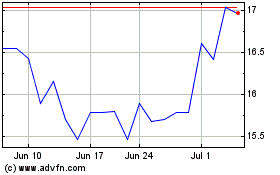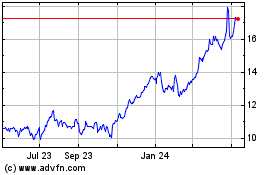By Jenny Strasburg
Deutsche Bank AG said Thursday net income in the first quarter
declined 79% and that it will shrink its U.S. investment bank, the
latest sign of struggle at the German lender, which this month
replaced its CEO and reshuffled several other top executives.
The bank said it is pulling back in certain trading and lending
activities that don't make enough money to justify costs and risks,
especially in the U.S. and Asia. It will eliminate jobs in its
investment bank, describing the cuts as a "material workforce
reduction" through the rest of this year, without providing
numbers.
Hedge funds will get less of Deutsche Bank's balance sheet to
amplify their stock trades. German and European wealthy clients and
companies will get more funding and attention from Germany's
biggest bank, Deutsche Bank said.
Investors have been calling for such moves amid signs that
Deutsche Bank's strategy was failing. The actions reflect pressures
on the lender to scale back its global ambitions and cut costs
after years of losing market share to stronger banking rivals.
The bank's net income fell to EUR120 million ($145.9 million) in
the quarter. Companywide revenues declined 5% to EUR7 billion.
First-quarter revenues in the investment bank declined 13% to
EUR3.8 billion, with fixed-income trading revenues down 16% and
equities sales trading revenues down 21%. Euro exchange rates and
some one-time events helped amplify the trading-revenue declines.
All of the bank's major divisions saw revenue declines.
The first-quarter report is Deutsche Bank's first since it
ousted Chief Executive John Cryan, a Briton, on April 8, replacing
him with Christian Sewing, a German executive who has spent his
entire career at Deutsche Bank.
Mr. Sewing most recently oversaw the retail- and
commercial-banking division, after years in senior risk-control and
auditing positions. He is shepherding plans to curtail the lender's
once-lucrative businesses in its division that advises companies on
deals, underwrites stock and bond offerings and trades
securities.
"There is no time to waste," Mr. Sewing told analysts on a
morning call, saying the dismal first-quarter results underscored
the "need for immediate action." He promised further changes in
coming months, saying that he and other Deutsche Bank executives
understand why investors have lost patience.
"The call to action is simple: Focus, grow revenues and
significantly reduce costs," Mr. Sewing said. He said executives
"will not agonize over decisions."
That remark reflected persistent complaints from Deutsche Bank
supervisory and management board members that Mr. Cryan was sharply
analytical but slow to make difficult decisions, helping create a
state of paralysis in Deutsche Bank's top ranks, according to
people inside and outside the bank. Mr. Cryan hasn't commented on
the criticism.
Deutsche Bank said it plans to shrink its equities-trading
business and its prime-brokerage business, which loans money and
securities to hedge funds and other trading clients. It will scale
back trading in U.S. interest rates and focus on helping European
clients do deals, manage their cash and global payments and hedge
currency risks.
Mr. Sewing said the "material workforce reduction" will focus on
the investment bank, including cuts to technology and other
back-office jobs. The bank will also continue to shed real
estate.
In the past three weeks, Deutsche Bank announced that two other
senior executives besides Mr. Cryan--investment-banking co-head
Marcus Schenck and operations and technology chief Kim
Hammonds--will leave effective next month. Their departures, tied
to the CEO change, are part of the third high-level shake-up at the
lender since Mr. Cryan took over as CEO less than three years
ago.
As part of the changes, Deutsche Bank put Garth Ritchie,
previously co-head of the investment bank, in charge of that entire
division, and named a new chief operating officer from the
retail-banking division. That new operations chief, Frank Kuhnke,
won't serve on the management board, unlike his predecessor; the
role was downgraded to one level below the senior ranks.
Under Mr. Cryan, Deutsche Bank settled big legal cases that had
hung over the lender, raised $8.5 billion in capital and set about
cutting billions in expenses. But it missed cost-cutting targets
and suffered continued revenue declines, losing market share to
stronger rivals and posting three consecutive full-year net
losses.
Deutsche Bank's shares have fallen 24% this year and are down
more than 30% from a year ago. Investors and analysts have been
demanding that executives clarify the bank's strategy, with some
saying its U.S. investment bank should give up competing
head-to-head with bigger, stronger U.S. competitors.
In recent weeks, Deutsche Bank executives both publicly and
privately have resisted calls to alter the lender's strategy
dramatically. They've argued that maintaining most of the global
investment-banking operations is key to the lender's core mission
of serving German companies abroad, while conceding that those
businesses do need to be trimmed.
Even compared to other European investment banks still battling
through multiyear turnarounds, Deutsche Bank's challenges are
immense, investors say. Its German home market trails the U.S. and
U.K. in retail- and investment-banking profitability, and compared
to its big Swiss rivals, Deutsche Bank lacks scale in private
banking and wealth management. Those deficits leave Deutsche Bank
more reliant on volatile trading and investment-banking revenues,
despite ongoing attempts to depend less on those businesses.
Write to Jenny Strasburg at jenny.strasburg@wsj.com
(END) Dow Jones Newswires
April 26, 2018 03:31 ET (07:31 GMT)
Copyright (c) 2018 Dow Jones & Company, Inc.
Deutsche Bank Aktiengese... (NYSE:DB)
Historical Stock Chart
From Mar 2024 to Apr 2024

Deutsche Bank Aktiengese... (NYSE:DB)
Historical Stock Chart
From Apr 2023 to Apr 2024
